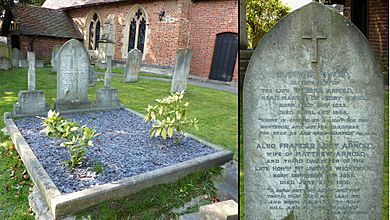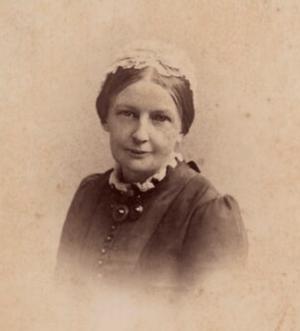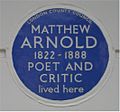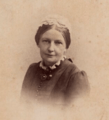Matthew Arnold facts for kids
Quick facts for kids
Matthew Arnold
|
|
|---|---|
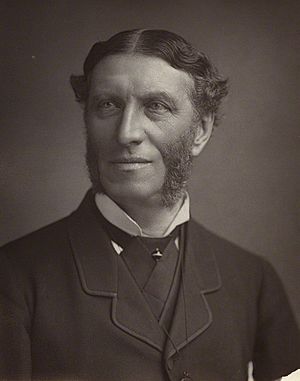
Portrait by Elliott & Fry, c. 1883.
|
|
| Born | 24 December 1822 Laleham, England |
| Died | April 15, 1888 (aged 65) Liverpool, England |
| Occupation | Her Majesty's Inspector of Schools |
| Education | Balliol College, Oxford (BA) |
| Period | Victorian |
| Genre | Poetry; literary, social and religious criticism |
| Notable works | "Dover Beach", "The Scholar-Gipsy", "Thyrsis", Culture and Anarchy, Literature and Dogma , "The Study of Poetry." |
| Spouse |
Frances Lucy
(m. 1851) |
| Children | 6 |
Matthew Arnold (born December 24, 1822 – died April 15, 1888) was a famous English poet and writer. He also worked as an inspector of schools for many years. His father, Thomas Arnold, was the well-known headmaster of Rugby School. Matthew Arnold was known for writing about important social issues of his time. He believed in the idea of schools being regulated by the government.
Contents
Matthew Arnold's Early Life
Matthew Arnold was born on December 24, 1822, in Laleham-on-Thames, England. He was the oldest son of Thomas Arnold and Mary Penrose Arnold. In 1828, his father became the Headmaster of Rugby School, and the family moved there.
When Matthew was young, he was tutored by his uncle, John Buckland. The family also had a holiday home in the Lake District. There, the famous poet William Wordsworth was a neighbor and a close friend.
In 1836, Arnold went to Winchester College. But in 1837, he returned to Rugby School and was taught directly by his father. He wrote poems for a family magazine and won school prizes. His prize-winning poem, "Alaric at Rome," was even printed.
In 1840, at age 17, Arnold started studying at Balliol College, Oxford. He won a scholarship in 1841 and earned his degree in 1844. During his time at Oxford, he became good friends with Arthur Hugh Clough. Matthew's father passed away suddenly in 1842. In 1843, his poem Cromwell won a special prize.
After teaching briefly at Rugby, Arnold became a Fellow at Oriel College, Oxford, in 1845. In 1847, he became a private secretary to Lord Lansdowne. In 1849, he published his first book of poems, The Strayed Reveller. When Wordsworth died in 1850, Arnold wrote "Memorial Verses" about him.
Marriage and His Job as School Inspector
Matthew Arnold wanted to get married but couldn't afford a family on a secretary's salary. So, in April 1851, he got a job as one of Her Majesty's Inspectors of Schools. Two months later, he married Frances Lucy.
Arnold often called his work as a school inspector "drudgery," meaning it was hard and boring. However, he also admitted that having a regular job was good for him. At first, his job required him to travel all over England. He spent many hours on trains and in small towns. This meant he saw more of England than most writers of his time. Even though his travel area became smaller later, he knew a lot about life in different parts of England.
Matthew Arnold's Writing Career
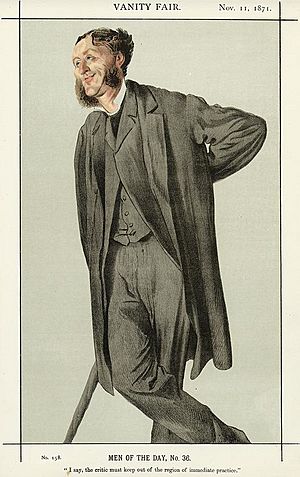
In 1852, Arnold published his second book of poems, Empedocles on Etna, and Other Poems. In 1853, he released Poems: A New Edition, which included new poems like Sohrab and Rustum and The Scholar Gipsy. Another collection, Poems: Second Series, came out in 1854, featuring the new poem Balder Dead.
In 1857, Arnold was chosen to be the Professor of Poetry at Oxford. He was the first person in this role to give his lectures in English instead of Latin. He was re-elected in 1862. His lectures led to works like On Translating Homer (1861) and ideas for Culture and Anarchy. In 1859, he traveled to Europe three times to study their education systems.
In 1865, Arnold published Essays in Criticism: First Series. Another collection, Essays in Criticism: Second Series, was published after he died in 1888. In 1866, he wrote Thyrsis, a poem remembering his friend Clough, who had died in 1861.
Culture and Anarchy, one of Arnold's most important works about society, was published in 1869. Literature and Dogma, his main work on religion, came out in 1873. In 1883 and 1884, Arnold visited the United States and Canada. He gave talks about education, democracy, and the writer Ralph Waldo Emerson. He retired from school inspection in 1886 and made another trip to America.
Matthew Arnold's Death
Matthew Arnold died suddenly in 1888. He had a heart failure while running to catch a tram in Liverpool. He was going to meet his daughter, who was visiting from the United States. His wife outlived him, passing away in 1901.
Matthew Arnold's Personality
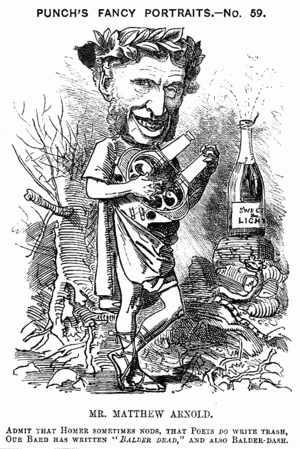
G. W. E. Russell described Matthew Arnold as "a man of the world entirely free from worldliness." This means he was social but not focused on money or fame. He was known for being charming, enjoying fishing, and being a lively talker. He read a lot and filled many notebooks with his thoughts.
In his writings, he sometimes confused people because his polite, even playful, way of arguing seemed different from the serious ideas in his poetry and criticism.
Matthew Arnold's Poetry
Matthew Arnold is often considered one of the three most important Victorian poets, along with Alfred, Lord Tennyson and Robert Browning. He knew his own place in poetry.
His poetry is still studied today because it shows many important ideas from the 1800s. Especially, it shows how people's faith changed due to new ideas and doubts.
His poetry career began in 1849 with The Strayed Reveller and Other Poems. This book didn't get much attention. It included "The Forsaken Merman," which is one of his most poetic works. Empedocles on Etna and Other Poems (1852) also didn't become very popular.
His 1867 poem "Dover Beach" describes a world where old religious beliefs are fading away. This poem is sometimes seen as an early example of modern writing. Arnold admired William Wordsworth, and Wordsworth's influence can be seen in Arnold's best poems. "Dover Beach" is featured in Ray Bradbury's novel Fahrenheit 451 and Ian McEwan's novel Saturday.
Matthew Arnold's Prose Writing
Many experts today believe that Arnold's prose (his non-poetry writing) is even more important than his poetry. Some readers who only know his poems like "Dover Beach" might be surprised to learn he wrote so much prose.
Arnold's prose writing can be divided into three main periods:
- Early literary criticism: This includes his thoughts on poetry.
- Middle period: This focused on social, political, and religious topics.
- Later literary criticism: He returned to writing about literature.
Many critics prefer his literary criticism over his social or religious writings.
Literary Criticism
Arnold's work as a literary critic started with the "Preface to the Poems" in 1853. In this, he explained why he left out his poem "Empedocles on Etna." He emphasized the importance of the subject in poetry and the need for clear, simple writing, like the ancient Greeks.
His literary criticism became a main focus when he became Professor of Poetry at Oxford in 1857. He held this position for ten years. His lectures were published as On Translating Homer (1861). Arnold believed England needed fair and smart literary criticism.
Arnold is famous for creating a new way of literary criticism. He often moved easily between talking about literature and discussing social or political issues. His Essays in Criticism (1865, 1888) still influence critics today. In his essay "The Function of Criticism at the Present Time," he wrote about the critic's role in finding and promoting good literature. He believed that criticism should be "disinterested," meaning it should judge a work for what it truly is, without personal bias.
Social Criticism
Arnold moved from literary criticism to looking at the overall "spirit of his age." Between 1867 and 1869, he wrote Culture and Anarchy. In this book, he used the term "Philistines" to describe the middle class in Victorian England. He meant people who were too focused on money and material things and didn't care much about culture or ideas.
In Culture and Anarchy, Arnold called himself a "Liberal" and a "believer in culture." He thought that a good education, especially reading classic works, was very important. He believed this would help people develop their "best self." Even though he disagreed with some groups, Arnold remained a loyal Liberal. In 1883, William Ewart Gladstone, the Prime Minister, gave him a yearly payment for his contributions to English poetry and literature.
Many later critics have highlighted Arnold's liberal ideas. Some say his work was a "liberal critique of Victorian liberalism." He criticized the middle class for being too focused on money and not enough on culture.
Journalistic Criticism
In 1887, Arnold was credited with creating the phrase "New Journalism." This term later described a whole new style of newspaper writing. However, Arnold was actually criticizing the sensational (exciting and shocking) journalism of the Pall Mall Gazette editor, W. T. Stead.
Arnold had a good relationship with the Pall Mall Gazette for a long time. But he strongly disliked Stead's style, saying that the newspaper was "fast ceasing to be literature." He was shocked by the sensational newspapers he saw during his trip to the United States in 1886. He wrote that if someone wanted to destroy self-respect and appreciation for elevated things in a nation, they should "take the American newspapers."
Religious Criticism
Arnold's religious views were quite different for his time. He was influenced by Baruch Spinoza and his father. He didn't believe in the supernatural parts of religion, like miracles, but he still found church rituals interesting.
In his book God and the Bible (1875), Arnold wrote that while the stories of Christianity have "power and pathos," they are "not true; it never really happened." He believed that the figures in Christian heaven were no more factual than the gods of ancient Greece. He also said that the word "God" is often used as a poetic term, not a scientific one. He famously defined religion as "morality touched with emotion."
However, he also wrote that changing from a Christianity based on miracles to one based on "natural truth" is a big step. He felt this change could only be made by those who loved Christianity so much that they couldn't give it up, but also had to be honest about it.
Matthew Arnold's Reputation
Harold Bloom believes that while Arnold was a good critic, his poetry might not deserve the high reputation it has had. He calls Arnold a "very good, but highly derivative poet," meaning his style was very similar to others.
The writer John Cowper Powys admired Arnold. He wrote that Arnold's poetry is "arresting from cover to cover." He saw Arnold as a great "amateur" of English poetry, someone who seemed like a smart, friendly scholar chatting with his students.
Matthew Arnold's Family
Matthew and Frances Arnold had six children:
- Thomas (1852–1868)
- Trevenen William (1853–1872)
- Richard Penrose (1855–1908), who became an inspector of factories
- Lucy Charlotte (1858–1934), who married Frederick W. Whitridge from New York
- Eleanore Mary Caroline (1861–1936), who married twice
- Basil Francis (1866–1868)
Images for kids
-
Portrait by Elliott & Fry, c. 1883.
-
Caricature by James Tissot published in Vanity Fair in 1871
-
Caricature from Punch, 1881: "Admit that Homer sometimes nods, That poets do write trash, Our Bard has written "Balder Dead," And also Balder-dash"
-
A London County Council blue plaque for Arnold at 2 Chester Square, Belgravia
See also
 In Spanish: Matthew Arnold para niños
In Spanish: Matthew Arnold para niños
 | John T. Biggers |
 | Thomas Blackshear |
 | Mark Bradford |
 | Beverly Buchanan |


